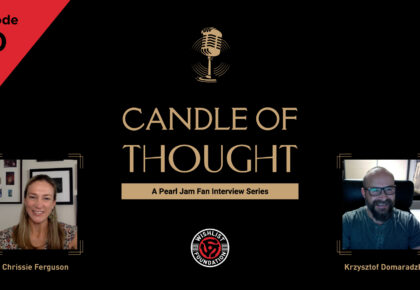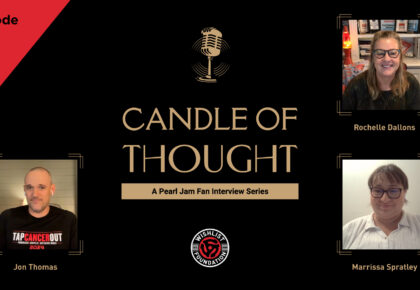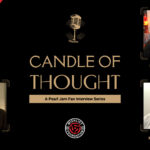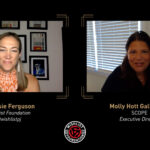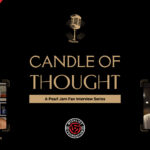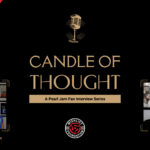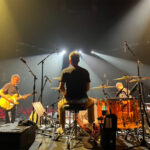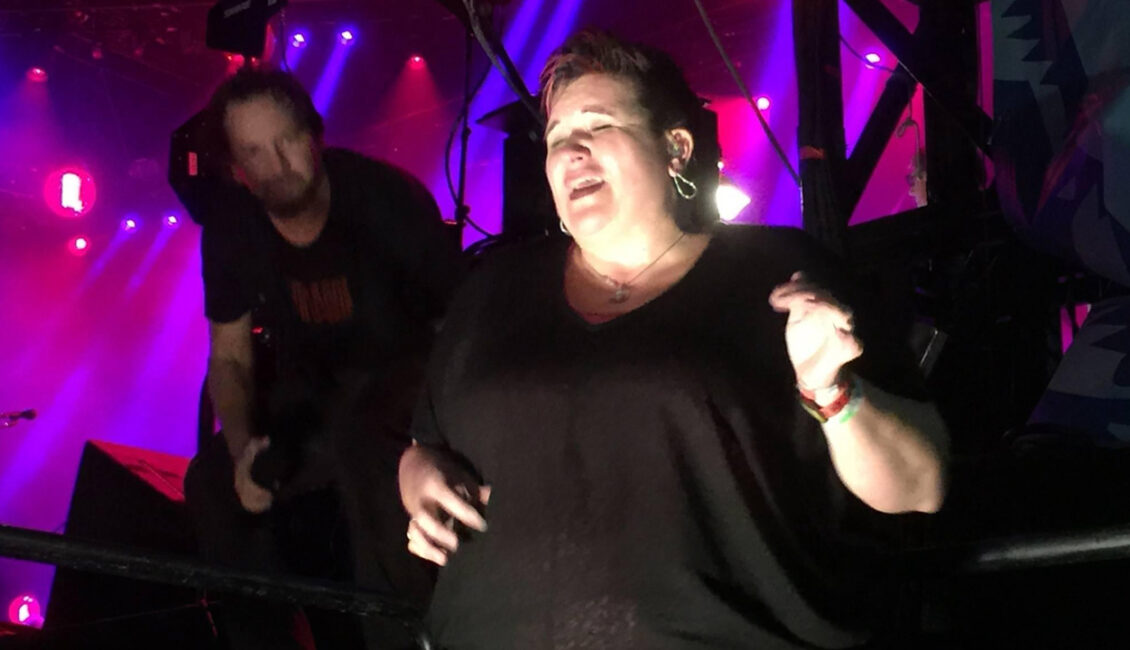
By Staff Writer, Chrissie Ferguson
In a world that all too often seems divided, there is one thing that unites us all — music.
Whether it’s rock, hip hop, R&B, country, or our favorite band, Pearl Jam — it doesn’t matter — because when music fans gather together in one venue, listening to their favorite band or vocalist, the worries of the world are cast aside and the rush of emotion immediately takes over.
I have felt it before. Have you? The excitement that has built up for days, weeks and months to that long-awaited moment when the band finally takes the stage?
The house lights dim.
The stage illuminates.
Chords are strummed.
And the first song on the setlist is revealed.
Just like that — the mesmerized crowd of people — as if directed by a conductor — sings at the top of their lungs in unison. It’s an indescribable connection between humanity, as one room of people shares so much energy, so much love, so much emotion. And the world actually feels at peace for a single moment in time.
That magic that we all have felt as Pearl Jam fans throughout the years has not only been brought to the stage by the band members and the phenomenal crew, with Kille Knobel and Karrie Keyes at the helm, but thanks to another group of people —music interpreters — the music experience can be felt and heard by EVERYONE who attends a show.
One music interpreter, in particular — Amber Galloway — has been bringing music to life, including Pearl Jam shows, for the deaf and hard of hearing for over 22 years.
Galloway not only has years of interpreting experience, but she is CEO of an interpreting agency specializing in Music & Entertainment (ambergproductions.com). She is also the co-founder of ASL Music Camp which is designed for interpreters, both certified and non-certified, as well as music enthusiasts. Most importantly, Galloway is a trailblazer in the community as she works tirelessly to advocate for the deaf and hard of hearing, making sure that music is accessible to all.
CHRISSIE: Amber, thank you so much for talking with us today. It is such a pleasure to speak with you.
AMBER: Thank you for having me. It’s an honor.
CHRISSIE: So, Amber, I reached out to you originally because I’ve always been moved by the ASL interpreters at concerts, and most recently, last year, I felt that it was a very emotional experience as we were at Bourbon and Beyond in Kentucky. I was up pretty close to one of the interpreters, and I really felt mesmerized by her presence and the presence of all the interpreters who were up there. It was quite an emotional experience.
Even though I don’t have any hearing loss, I felt like I was captivated by all that the interpreters were doing. I was just wondering how that feels for you and for other interpreters when they’re up there on that stage with these bands. Are you having an emotional connection as well with the audience members?
AMBER: Oh for sure because energy just goes through us both ways, so if we’re doing a really good job of embodying the artist, we’re literally becoming just like a conduit. It’s an extra part of the actual performance. So if we’re taking on all that energy we’re putting that energy out, and then with that massive amount of people that energy comes in, so it literally comes through us and it’s probably one of the greatest experiences that I’ve ever had — actually feeling that energy go back and forth. And I give huge props to artists that can command that and do it really well. Because there have been a few times where I’ve been brought on the stage to be the center of attention and it freaks me out. But when I’m in my little place I feel like, “Okay I can do this” because I’m a conduit and I’m not the whole focus of the entire show.
So it’s a huge amount of respect for the artists that do it and do it well because it is a challenge for sure. But yeah, energy is very much alive and it’s the greatest thing I’ve ever experienced. Actually, one of my happiest places is right before the show when I’ve prepped the artists. I got the artist down and then I feel that energy coming back and forth through the artist and the guest. There’s nothing like it.
CHRISSIE: Speaking of that — when you’re prepping for this — I know there had there has been a little bit of talk sometimes from interpreters who don’t quite understand what maybe Eddie is saying or what the lyrics are because we all know it’s sometimes hard to understand especially, you know, those earlier songs like “Even Flow.” I know that you do a lot of preparation and you do have a team if you are going to be interpreting for a certain band. So what all goes into that prior to taking the stage?
AMBER: So typically what we often do as a team is we will assign the concerts that we’re going to interpret, and then we start researching the band.
We want to know who they are and what their backgrounds are because a lot of that will influence their lyrics. And so we need to know what their lyrics are about and then we delve into the lyrics, and then we break them down so that it can be changed into American Sign Language because a lot of people think American Sign Language is verbatim English and it’s not; it’s its own language.
It has all of its own rules. It’s different. So we have to actually switch it and change it to where it’s going to be linguistically sound. And so we work through the concepts. We think about the concepts that they’re bringing.
And then in that process of the concepts, we try to memorize as much as possible. So what I do for me, because I’m such a highly visual person, and I also have significant hearing loss, I memorize and I make storyboards in my head.
And I also draw them on the lyrics, or I’ll draw little stories next to each stanza so that I know what I’m going to sign. And I already have the picture written in my head so that I’m making a storyboard.
And I’m going to deliver that through the song.
CHRISSIE: Do you get the set list ahead of time for most concerts? Or are you not aware of what’s coming up next?
AMBER: Well, when I first started, I would read all kinds of music magazines to try to get reviews of concerts.
I would do everything I could. I would research as much as possible, read every article I could to try to get a setlist when I first started. Now it’s super easy. So there’s setlist.fm.
And so that makes an entire bank of the last year of concerts. So what we do is we look at that, we, you know, copy and paste, and then we look at all those songs and then we divide and conquer. We assign it and we sometimes fight over specific songs or however we think that the setlist is going to go, then we divide it and we switch off about every three to four songs typically.
And then we just research the hell out of it and we get the meaning and then we get ready to be on stage. And then while we’re on stage, because a lot of times sounds are hard to hear or whatever is happening or the person is the mumbler or whatever, I have a team that’s down in the pit and they are feeding me whatever I’m missing or if I’m looking at them or they’re feeding me the whole time so that I still stay on point for what the artist is saying, because sometimes it’s not clear.
CHRISSIE: And so you said a few, you’ll kind of switch out. And I did notice that, after maybe every few songs, a new interpreter would come out. It’s exhausting, right? I mean, not just the preparation, but as I was saying, with the interpreter, I witnessed last year, it was her whole body, not just her hands that was into the music. So is that a huge part of it? It’s just very tiring to be up there as well.
AMBER: For sure, and research has shown that after 20 minutes, we start to have a linguistic breakdown, and that’s with any interpreter, and it’s even more so with sign language because of the physicality of it.
But then specifically, for our team, the theory that I’ve come up with is I wanted to make sure that I could show all of the language and all of the voices, and all of the voices also mean instruments.
And so for many years, interpreters would ignore the instruments and do like a “Vanna like” look at the guitar, but I had very close friends with me that are profoundly deaf, and they’d say, okay, I see the guitar, I see people laughing and smiling, and they’re clapping, but it doesn’t make sense to me.
I don’t understand what’s happening. So then I started talking through that, and then I started researching deaf storytellers to see how they dealt with different sounds, and I compared them to the different instruments and applied all of the language from our existing language to specific sounds within music and guitars and stuff like that.
So then it’s even more tiring when it’s a jam band and they’re wailing for 10 minutes on different guitars. That is when you get really tired because you’re just having to wail all yourself as well.
And it’s not air guitars. A lot of times people think, oh, that person’s playing air instruments, but it’s not at all. It’s actually linguistically sound communication that we’re actually putting out for our deaf guests.
CHRISSIE: That’s amazing. And there’s something too about the feeling. I read something about having people who are hard of hearing or who may be deaf to kind of be closer to where they’re feeling the beat, whether it’s underneath their feet or, sometimes I even feel it in my chest if I’m close enough to the beat of what’s going on.
So does every band that you interpret for, do they have that ability to have that? I mean, I guess there’s the natural sound (feeling) from the bass in the stereos, but are there other things that are put in place so that the deaf and hard of hearing can really feel the rhythm and the beat as well when they’re up there?
AMBER: Well, there are some companies that specialize in and actually have created Vibro technology where it’s a vest or wristbands, or sometimes it’s just one vibration that goes to the back, but that also is just the bass oftentimes.
But when we get close enough, we can feel the music, but this is the thing that a lot of people don’t realize, because when deaf people get closer, deaf and hard of hearing people — and I’m just talking from my experience — the way that I walk through life as a hard of hearing person, is that when I’m closer, I can watch the singer and I can read the lips and see their expression better than if I’m far back because the camera is going to always go away, right?
The camera will focus on different members of the band. So I don’t have that constant ability to look at the artist. So I can see the interpreter, I can see what the interpreter is doing, but at the same time, I have that direct sight line so that I can also read the expressions of the artist.
Hearing people can look around and look down and then you’re still getting access to the music, the tonality, everything that the artist is bringing. So the way that I get that same experience is when I’m close, I can see the artist, see the facial expressions, and then be able to see the interpreter and be close to the speakers to feel the vibrations.
CHRISSIE: So tell us about interpreting for Pearl Jam. Have you done several shows, or was it just one show?
AMBER: Oh, no, no. I’ve interpreted them several times. My story and connection to them, I remember, is when I was 11 and my dad gave me a cassette of Pearl Jam.
And that was my first experience with Pearl Jam. And then years later — many, many years later — then I finally got to interpret for them. And that also I feel like evolved in where I was also emotionally and mentally, because I would connect to these songs based off of my own like family connections, you know, so I would have to think about the interpretation and not let my interpretation interfere with the interpretation of what the song is about.
So it’s always really a beautiful thing. And I mean, Pearl Jam, I always felt like it has been a really important part because music is about connection. And most of all the people in my life, they have brought me music in some way, and they have connected me.
And Pearl Jam was my connection with my dad. And our relationship has always just been about music. And he introduced me to different music that I was really interested in, because that’s what you hope that we can do as parents is we can teach our kids about good music.
CHRISSIE: What was your favorite Pearl Jam song to interpret?
AMBER: I love “Alive”. “Daughter” is probably my favorite. I think that’s my favorite one of all.
CHRISSIE: And is that because of your connection to your dad?
AMBER: Yeah, yeah, totally.
So I love that one. I would have to look at that. I know the songs, like almost by heart, but I don’t always remember the names.
CHRISSIE: Kim Schaefer, she was an interpreter who really caught the eye of Pearl Jam fans years ago.
Unfortunately, she’s since passed away. But the video that I’ve seen was — I believe — that she was interpreting for her students, and then Eddie brought her up on stage to interpret “Given to Fly”.
I’m wondering, do you feel like that moment really opened the doors to awareness of the need for interpreters and for the deaf and hard of hearing at concerts? Or do you think it was kind of always there before that?
AMBER: Yeah, I think that it’s really interesting because most of the time I’ve had some viral videos and the comment section almost always says, “Why do deaf and hard of hearing people go to concerts, and it’s like why do you go to a concert?”
It’s the same thing. It’s about the experience of what live music does. You get these artists and you get this connection. And so I think also it’s kind of those connections that happen for me.
I have that connection with my dad. So I know my friend said she loved this one specific band because her dad always wore the t -shirts. And so she didn’t really have a lot of connection with him, communication-wise because he didn’t sign — she was deaf — but her connection was “that band is my favorite band because it’s my dad’s” and so when you have those connections that’s what I think drives it, and then when you go and bring everybody together at a live event from all different backgrounds, they come together for that shared experience.
There’s no other connection like it and then again, it’s that energy. It’s the energy that’s flowing. It’s how the artist is working that energy. They’re feeling it and I think that when awareness comes about people start to say “Oh well, I never knew that” because it doesn’t affect their way when it doesn’t affect their world. How would they ever know that that was there?
So I think that the more awareness is to know that there are Pearl Jam fans that are hard core deaf and hard of hearing Pearl Jam fans. I’m telling you — like hardcore — that know all the songs that they’re actually signing in the pit. They could get up on stage and probably interpret ten times better than half of us because that’s all their favorite songs.
So I think that awareness is always helpful and to show people that just because somebody has a different walk in life doesn’t mean that we shouldn’t ever include them. And I wish that it happened more from the artist’s side because there are so many battles to actually obtain access.
That’s what we’ve experienced, that’s what I’ve experienced. It’s what many of my friends have experienced is the lack of awareness and then also so many barriers to obtain access to their favorite artists.
CHRISSIE: For some of these festivals, like most recently, Bottle Rock, I noticed when you’re getting tickets that it would say that you can request an ASL interpreter. Is that how that comes to be or at most of these festivals, is that something that will always happen even if it’s not requested?
AMBER: So it’s really interesting. During the pandemic it was actually like a restart. So I had the opportunity to talk to a lot of different production companies about how to proactively provide, and I think that’s the key in what artists as well as producers and managers can really proactively provide. So there is one production company that often proactively provides that they’re going to provide no matter what. They’ll provide the headliners and then if there are deaf and hard of hearing people that bought tickets they can request other shows. And I find that to be so honorable because we’re here, we go to shows. But our way to try to get access to the shows has so many barriers to it. And so I think it’s a beautiful thing. So festivals, after the pandemic, have really made a turn to start providing. But it’s not always automatic. There are a lot of festivals out there that won’t provide or sometimes even deny and I mean that’s not okay or legal. But it’s a huge fight to try to get it. So if you proactively provide and say “no, this is what I want” or if artists are like “hey It’s in my rider; you have to provide” then the festivals have to provide or the venues have to provide. And then you can advertise it because I have seen the festivals — I mean I work a lot of them — my team works bottle rock, but in a lot of places that I have experienced in the last two years, the numbers for ticket sales have tripled. The number of guests coming that are deaf and hard of hearing have tripled, so when you do right by humanity the the profits will come.
CHRISSIE: And everyone’s included.
Exactly. Nobody is ever having to fight. We shouldn’t have to fight to see our favorite artists. We shouldn’t have to fight. There’s no reason to fight anymore. Just make sure okay — this needs to happen, lights, mics.
Oh yes, interpreters have a budget line. It’s a part of your tour. Budget line done. And not only here, but in the world, because there’s deaf and hard of hearing people that want to have access and watch their favorite artists. Automatically do it.
CHRISSIE: And that’s a great segue into my next question of what it is that you are doing right now in your workshops and your production company. Can you tell us a little bit about what it is that keeps you so busy every day currently?
Yeah. So I have been teaching since about 2005. And I was teaching at a lot of the local community interpreter programs. And then I also started developing workshops. And so now I’m actually teaching workshops all over the world on how to interpret music, but also how to show the instruments.
Because it’s taking a language that’s already been existing but applying it to instruments to make sure that we’re also giving the deaf and hard of hearing community everything because like I said, for years the deaf and hard of hearing people used to just get an interpreter then highlight these instruments, and it wasn’t coming through. So also what was really cool is a deaf person had told me one time that they started learning what instruments felt like because I would show the different instruments so that vibration would come through.
So I teach workshops. I am actually here in Alabama today. We’re going to teach workshops. We’re going to teach interpreting music to about, I think, 30 deaf and hard of hearing students today. We’re going to teach them about that and then this week we have Bonnaroo. And then on top of that we have this summer in July, we have ASL music camp and so it’s a week-long intensive music camp where we get interpreters that come from all over the world to learn about music interpreting and how to do it the best that they can. And I just travel a lot doing a lot of music festivals, running a lot of the music festivals.
The other really cool thing over the last two to three years is I’ve really started training up deaf interpreters. So these are people who cannot hear or have various variant hearing loss and they’re actually on stage representing the artist, and because they’re also huge fans of music like I said, and so they need to be on stage. As native users they love the music and they want to be able to show the music and show it to their community. So I have a pretty huge team and they also teach at these workshops as well.
CHRISSIE: That’s great. Can anyone who knows American Sign Language take your camp, or is it only for people who currently have a job as an interpreter?
AMBER: Oh no, anyone can come as long as they’re fluent in sign language because the whole camp is immersive, so you have to be able to understand sign language because that’s all we do. It’s a completely deaf immersive experience all in ASL. All of our communications are in ASL and then what’s really cool is they have to send in a video and then we teach them all week. And we have different events throughout the week and then different experiences, different practices, and then on the last night they perform. So yeah it’s really cool. We love it. I’ve seen so many people come out of that and then they join the team and then they have a career interpreting music after that.
CHRISSIE: And how did you get involved? There is a story I read that you were with a group of friends at a party, and they were signing the music to each other. Tell me a little bit about that.
AMBER: So what was interesting is that I think again it’s always that idea of what the hearing perspective could be. I was born and raised hearing until I lost my hearing at 22 and I would hang out with my friends on Friday nights when I was learning sign language. I was in an interpreter program, and we would be at my house just playing dominoes and playing spades and signing songs to each other and so one night I we had taken my whole family and all of my friends. We went to the Wildflowers and I watched the interpreters, and unfortunately it was not a successful interpretation. I love the wildflowers and I was like “what is happening here?”
And I looked at one of my closest friends and I said, “What is going on? This is not even interpreting anything that’s important and making you connect to the music.” And she said, “This is the best we have.” And I said, “Oh no, that is not the best. Something has to change.” And she says, “Well let’s change it.” And I said, “I don’t even know what to do because I was like a little baby interpreter, like brand new, so I didn’t even know what to do, but I was destined to make it happen so that there could be equality to the experience because deaf and hard of hearing people deserve to have equality to the experience. As a hard of hearing person I deserve equality to the experience so that’s what it kind of changed up.
And this was way over 20 years ago and that’s what I’ve been focused on and all of my energy on is creating this and it’s worked. I mean, like I said, the numbers have tripled. more access has happened. We made my company. We made Metallica’s brand new music release. Their whole new music release and we made their entire album accessible in ASL.
And I just hope and wish that all artists would make their debut albums, as well as all their hits accessible into ASL. Because if you Google it, you’ll see it, but a lot of it is butchered, messed up, very William Hung, karaoke versions in sign language of people who are not experts, of people who are not linguistically sound.
So you can find the interpretations, you can find them in ASL, but they’re not linguistically sound. And so if all artists were to be like, let’s go and let’s get this done, you know, who are the leaders in the field?
Let’s do that. And let’s get them on board and let’s make all of our music accessible. I truly think that would be like the hugest, largest change in how music can be accessed. That would be amazing.
CHRISSIE: That’s again, including everyone. That’s great. So we can look forward to seeing you and your team. You said Bonnaroo. And what else is coming up for you?
AMBER: I will be in the Colours of Ostrava.
And then I mean, we have (events) on my website. Every time we get a festival, we publish it there. So then you can see where my team is. We’re developing a new website where you can also read about all of my team members and their backgrounds.
And then you can follow their accounts. They produce a lot of songs that are very linguistically sound as well. They have a lot of training in music and they’re the players in the field, you know, they’re the ones that are on the stages, bringing music to life through their hands and face and movement.
CHRISSIE: That’s great. And so what is your website so we can share that with everyone for them to take a look?
AMBER: It’s ambergproductions.com.
CHRISSIE: Okay, great. Well, Amber, thank you so much for taking the time to chat with me today.
It is such a pleasure to meet you and to learn what you’re doing for the deaf and hard of hearing community. I think it’s amazing. Thank you so much.
AMBER: Thank you so much. Thank you for having me. I appreciate it.

